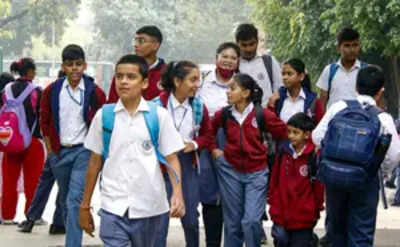
In a significant move to tackle the dual challenges of deteriorating air quality and the need for continuous education, the Commission for Air Quality Management (CAQM) has issued new directives regarding the conduct of classes in Delhi and the National Capital Region (NCR). These orders, prompted by the Supreme Court’s ruling, allow schools to operate in a hybrid mode, combining both physical and online teaching formats.This initiative, aimed at maintaining educational continuity during the ongoing air pollution crisis, will affect all schools up to the 12th standard in the National Capital Territory (NCT) of Delhi and other districts in NCR.
“State Govts in the NCR shall ensure that all classes upto 12th Standard are conducted in a “Hybrid” mode i.e., both in “physical” and also in an “online”, wherever online mode is feasible in the territorial jurisdiction of the NCT of Delhi and in the districts of Gurugram, Faridabad, Ghaziabad and Gautam Buddh Nagar in the NCR,” said the CAQM order.
“State Govts in the NCR shall ensure that all classes upto 12th Standard are conducted in a “Hybrid” mode i.e., both in “physical” and also in an “online”, wherever online mode is feasible in the territorial jurisdiction of the NCT of Delhi and in the districts of Gurugram, Faridabad, Ghaziabad and Gautam Buddh Nagar in the NCR,” said the CAQM order.
In a statement shared via Twitter, DC Gurugram (@DC_Gurugram) confirmed that the same relaxation will apply in the districts of Gurugram, Faridabad, Ghaziabad, and Gautam Buddh Nagar, urging educational institutions to comply with the hybrid model wherever feasible. This significant move, following the Supreme Court’s intervention, reflects the urgent need to ensure the safety of students during the ongoing air pollution crisis, while also safeguarding the educational progress of students in the region.
Supreme Court’s Directive and CAQM’s Response
On November 25, 2024, the Supreme Court issued an order directing the CAQM to consider relaxing certain provisions of the Graded Response Action Plan (GRAP) concerning educational institutions. The Court acknowledged several concerns, including the closure of schools and the resulting deprivation of mid-day meals, the limited access to online education for many students, and the lack of air purifiers in homes that made staying indoors no different from attending school.
In compliance with the Supreme Court’s directive, the CAQM granted relaxation for educational institutions in Delhi-NCR, particularly in colleges and higher education establishments, allowing them to operate in a hybrid mode. This enables both physical and online classes, providing flexibility for students and faculty during the high pollution months. However, the directive states that schools will continue with physical attendance unless specific circumstances permit online learning.
Air Quality and Education: The Hybrid Solution for Colleges
The hybrid education model for colleges and higher educational institutions will allow students to participate in classes either physically or online, depending on availability and personal preferences. This flexibility is particularly important in areas where air pollution levels are hazardous and public health concerns are paramount. The hybrid model provides an opportunity for students to continue their education while protecting their health.
For schools, the situation remains different. Due to the significant impact of the GRAP restrictions on students in classes X and XII, who are preparing for board exams, schools will continue physical classes. The physical mode is deemed necessary for practical lessons, lab work, and preparation for examinations. The CAQM’s decision to allow this continued physical attendance in schools is crucial for ensuring that educational outcomes are not compromised.
Flexibility for Families and Students
The key advantage of the hybrid system for colleges is that it allows students and their guardians to decide whether to attend classes in person or online, based on their individual circumstances. This is especially beneficial for students living in areas where air quality is severely poor or those who lack access to adequate resources for online learning at home.
However, the physical attendance requirement for schools ensures that younger students, particularly in senior grades, are not deprived of vital in-person learning, which remains essential for their overall development and exam preparations. This approach strikes a balance between maintaining educational quality and addressing the pressing environmental health concerns.
Long-Term Impact on Education
The hybrid model is expected to be implemented until further notice, likely lasting throughout the winter months when pollution levels are at their highest. While this measure is a temporary solution to the ongoing air quality crisis, it highlights the need for longer-term strategies to address both educational and environmental challenges in the region.
This new education model may also provide valuable insights for other regions grappling with similar environmental concerns, paving the way for more flexible educational systems. As Delhi-NCR continues to struggle with poor air quality, the need for sustainable solutions in both the education and environmental sectors becomes more pressing.
Balancing Education and Health Amidst Air Pollution Challenges
The CAQM’s decision to implement a hybrid learning model for colleges and higher educational institutions, combined with continued physical classes for schools, marks a significant step in navigating the challenges posed by Delhi-NCR’s air pollution crisis. This directive offers a flexible solution that protects students’ health while ensuring educational continuity. As the region faces ongoing pollution issues, this hybrid model may serve as a necessary compromise, ensuring that education does not come to a halt while public health is safeguarded.

